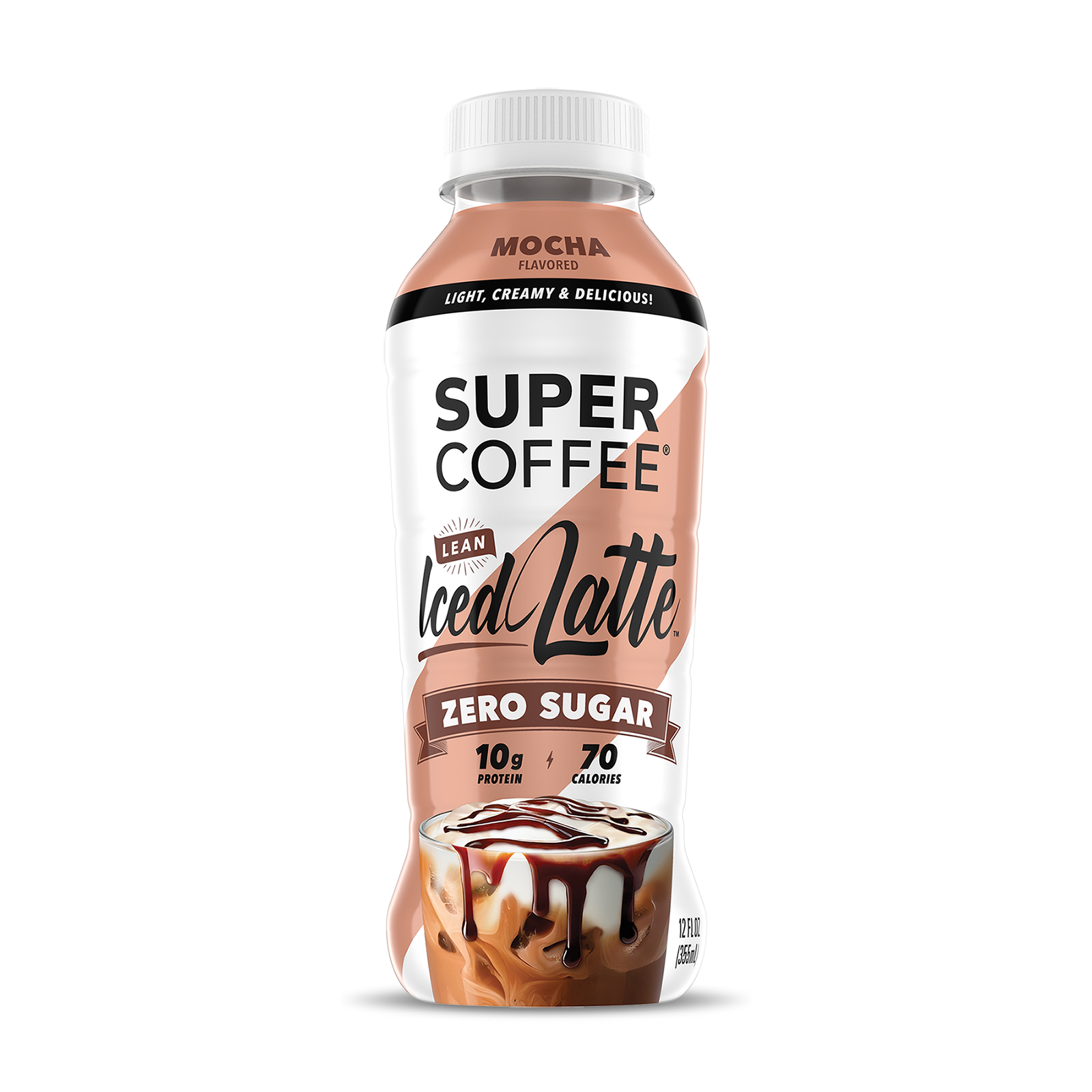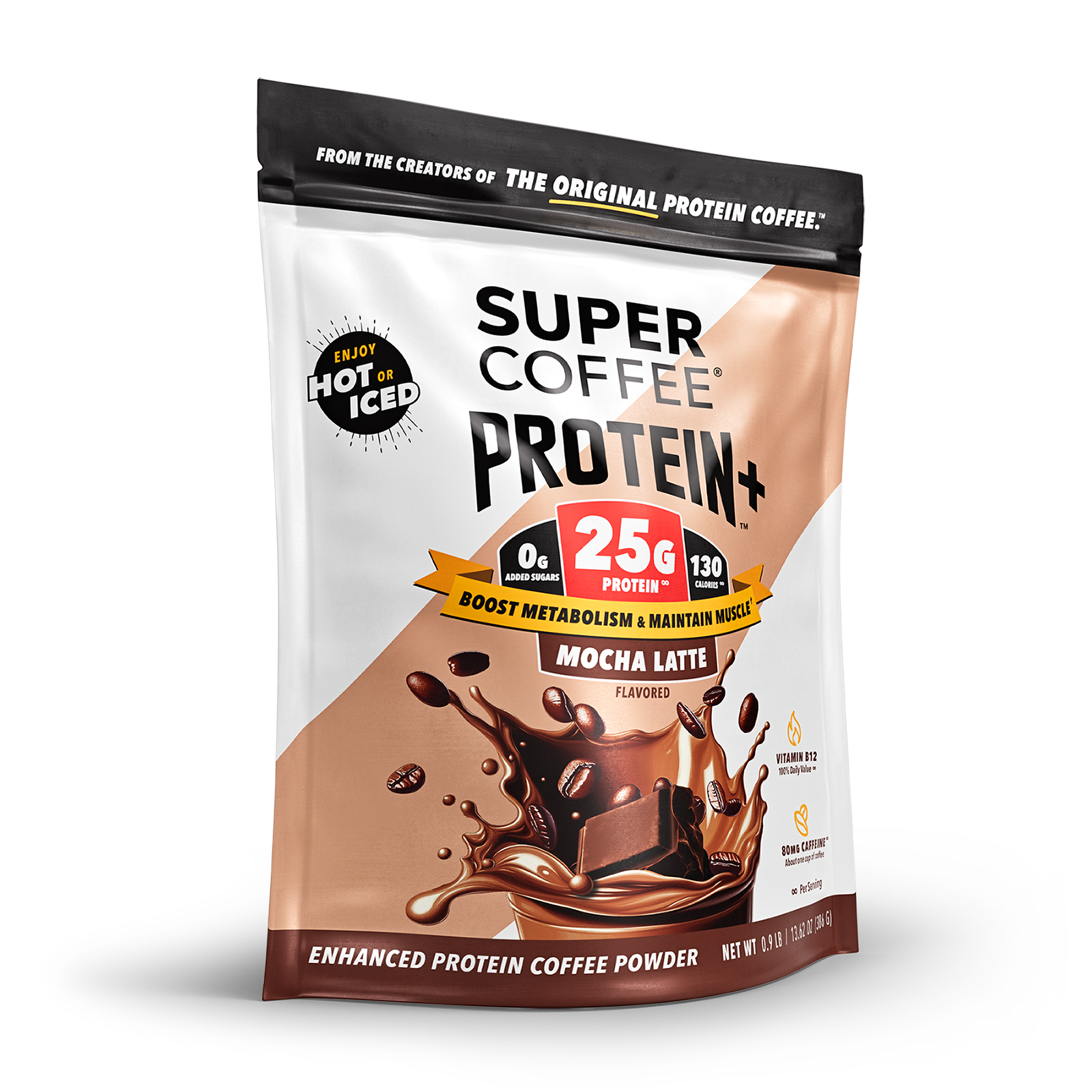Your cart is empty
A “nutrition” trend has become more and more popular recently: adding protein powder or shakes to coffee. It even has a name among TikTok aficionados: proffee.
Proponents say the blend is an easy way to combine caffeine’s ability to wake them up and boost energy, with the many health benefits of coffee and protein.
But why bother mixing coffee with protein powder or shakes – when you can simply use a delicious protein coffee creamer instead?
Let’s learn more about those creamers, their ingredients, and their effects.

What Is a Protein Supplement?
Protein, of course, is necessary for the body to function properly. Protein is essentially a chain of amino acids that the body can’t produce naturally, and those amino acids play roles in everything from the growth and repair of tissue to muscle building, digestion, hormone production, and immune function.
Whether they’re in the form of a powder, a shake, or a fortified coffee creamer, protein supplements usually contain one of four types of protein: whey, soy, casein, or collagen.
- Whey is one of the byproducts created when cheese is made. The whey is then processed and purified to remove carbs, fats and water. What’s left is whey protein powder. It contains all nine of the key amino acids the body needs for proper function, making it what nutritionists call a “complete” protein supplement.
- Soy is the most complete plant protein and also contains all nine crucial amino acids. Soy protein supplements are created from processed soybeans that have had their fiber and sugars removed.
- Casein is essentially the curds you learned about in the nursery rhyme phrase “curds and whey.” The casein protein used in supplements is also produced during cheesemaking, and it’s a complete protein. Casein is commonly known as “milk protein.”
- Collagen is the primary component of the connective tissues in muscles, skin and other parts of the body. Collagen supplements are made from ground animal skin and bones, eggshells, and fish scales, making them non-vegan.
Whey protein is most commonly found in supplements because it’s water-soluble, meaning it dissolves easily in water. It’s also popular because it’s believed to be the most anabolic protein, ostensibly able to jump-start muscle building.
By contrast, casein protein is anticatabolic, meaning it should be better at preventing muscle from breaking down. Soy is somewhere in the middle between whey and casein in terms of its anabolic properties.
Collagen protein serves a different purpose. It supposedly improves muscle, joint and skin health, and theoretically boosts the body’s ability to produce more collagen on its own.
We’ve alluded to what protein supplements are supposed to do. Let’s dig into that subject in more detail and determine if they really do it.

The Pros and Cons of Protein Supplements
Combining coffee and protein sounds like a no-lose proposition. Before jumping to conclusions, though, it’s important to learn more about protein powders and supplements.
Benefits of Protein Supplements
The reasons that people use protein supplements can be broken down into two categories: the benefits that have been proven, and the ones that haven’t.
Known Benefits of Protein Supplements
The most obvious benefit is that protein powder and drinks can help patients who don’t get enough protein in their diet. Most people are able to meet their body’s protein needs by eating meat, chicken, fish, and dairy products, but vegetarians and vegans may need an extra boost.
Some experts also say that using a protein supplement in the morning can be helpful to those who skip breakfast, and to those who don’t regularly eat protein with their cereal or eggs. Studies have shown that a protein-filled morning meal can reduce food cravings and consumption later in the day while providing better blood glucose control.
High levels of protein consumption are key components of many weight loss programs. That’s because burning protein requires more calories than burning carbs or fat. Supplements may help there too, since protein is best at providing the body with energy when it’s consumed throughout the day instead of during a single large meal.
Theoretical Benefits of Protein Supplements
Protein supplements supposedly contribute other additional health benefits. They include muscle building and repair, assistance with wound healing, and for those who need it, weight gain.
Athletes are most likely to use protein powders and shakes because of their reputation for improving stamina and performance. The supplements are also an integral part of bodybuilding regimens.
Does protein powder work for athletes and workout warriors? The evidence is somewhat conflicting, but studies have shown that these supplements appear to help boost performance and recovery during endurance and resistance training.
Some believe that consuming extra protein provides an energy boost. In reality, it provides long-term energy, although it does also slow down the body’s absorption of carbs, helping to prevent short-term sugar crashes.
The benefits of protein supplements for more general muscle building, wound healing and other purposes, if they’re not used in combination with exercise and a healthy diet, haven’t been either scientifically proven or ruled out.
Cons of Protein Supplements
The most important thing to know about protein powders, shakes and creamers is that extra protein may not help everyone, particularly those who eat lots of protein in their daily diet.
There are several other issues to be aware of, though, including the hazards of very high protein consumption.
Once protein accounts for more than 35% of daily calories, it can lead to fatigue, cramps, headaches, nausea, and bloating. Protein over consumption may also tax the kidneys or cause dehydration.
A bigger problem can be the supplements themselves. Many contain added sugar or oils, and those additives can lead to weight gain or other negative health complications. Some disreputable producers even include stimulants or steroids not listed on the products’ nutrition facts labels.
We’ll talk more about protein supplement products – specifically, protein coffee creamers – after a brief look at coffee.
The Health Benefits of Coffee
The biggest benefit most people say they get from coffee? The “pick-me-up” effects of the caffeine it contains.
Caffeine is a central nervous system stimulant, so it provides a temporary energy boost. Its perceived effects are enhanced by its ability to stimulate the release of the “happy hormone” dopamine. It also blocks the effects of a neurotransmitter called adenosine, which is responsible for telling the body when it should feel tired.
Those aren’t the only positive effects that coffee provides. It’s been linked to many health benefits, too.
- Caffeine has been shown to lower the risk for degenerative neurological diseases like Parkinson’s and Alzheimer’s, and moderate coffee drinkers may have a lower risk of cognitive decline.
- High levels of coffee consumption have been shown to reduce the risk of heart disease, although it could also boost blood pressure levels.
- Some studies claim that coffee drinkers may have a lower risk of developing type 2 diabetes.
- Research shows that those who drink lots of coffee per day have a significantly lower risk of depression.
- There’s research showing that increasing levels of coffee intake may be linked to an improved ability to burn body fat.
- Drinking 2-4 cups of coffee per day has been associated with a lower risk of death.
- Coffee consumed before exercise appears to boost endurance and physical performance.
Those are all good reasons to pour that cup of morning coffee – and perhaps to have several more during the day. The last one, however, brings us back to our main topic: consuming coffee and protein supplements together.

The Popularity of “Proffee”
Combining coffee and protein powder has become an internet craze, particularly on TikTok.
Proponents claim that it helps with weight loss, particularly for those on a low-carb diet, and that it ensures proper muscle growth and recovery. They also say that it provides an even greater energy boost than they get from drinking coffee by itself.
We’ve already looked at the science behind those arguments. It seems to suggest that protein supplements added to coffee could indeed benefit many people, even though protein products aren’t necessarily the godsend that some people believe them to be.
TikTok influencers usually make “proffee” by mixing coffee with a protein shake. It’s pretty easy to do, and the combination they create is likely to have a distinctive and delicious taste.
Others take their protein powder of choice and mix it into a cup of coffee. That doesn’t always work out well, since the powder may not fully dissolve in coffee and you can wind up with a clumpy or foamy mess. The better approach is to blend the coffee and powder together.
What if you also want to add milk, cream, or a creamer like Coffee-Mate? You’re adding more calories and carbs to the coffee and you’re diluting it even further. The same is true, to a lesser degree, for alternative milks and creams like almond milk, oat milk, or coconut cream that don’t contain added protein.
The smarter approach is to find a creamer that already has additional protein mixed in.
Best Protein Coffee Creamers
You’ll find a wide variety of creamers on this list. They don’t just come in different flavors; they have very different calorie and carbohydrate levels, and they provide different levels of nutritional benefits.
They’re all worth checking out, though, particularly the one we’ve chosen as the best protein coffee creamer.
1. Super Creamer
This delicious line of creamers is produced by the company that makes Super Coffee, the ready-to-drink keto-friendly coffee fortified with MCT oil, milk protein isolate, and all-natural sweeteners.
Super Creamer uses that same healthy approach. It’s a low-calorie, low-fat, sugar-free, and zero-carb coffee creamer that contains the natural sweeteners stevia and monk fruit extract. It also contains MCT oil, which supports cognitive function and helps keto dieters stay in ketosis and is a better alternative than coconut oil.
Some flavors of this creamer contain whey protein isolate for muscle-building and long-term energy; others contain high-quality pea protein which is also rich in iron and provides heart health benefits.
The Super Creamer flavors that contain milk protein are non-dairy and lactose-free; the ones with pea protein are dairy-free and vegan-friendly. All are gluten-free and need to be refrigerated.
You can choose from sweet cream, vanilla, French vanilla, caramel, caramel waffle, coconut mocha, toasted hazelnut, and unsweetened original flavors. And whether or not you’re looking for added protein, Super Creamer is a terrific keto coffee creamer.
2. LevelUp Grass-Fed Keto Creamer
We like liquid creamer more than powder. But if you prefer powdered creamer (or make your coffee somewhere without a refrigerator nearby), this is a good second choice.
Grass-Fed Creamer’s name is based on the fact that it contains both grass-fed collagen protein and grass-fed whey protein. It also contains MCT oil, butter and dry milk. That means it’s not vegan, dairy-free or suitable for those who are lactose-intolerant. It’s sweetened with a mixture of Allulose, monk fruit and stevia.
This collagen creamer isn’t zero-carb, but it only contains one gram of carbohydrates and four grams of protein. It also contains more fat, calories and cholesterol than Super Creamer, which is another reason we’ve put it into second place.
Grass-Fed Creamer is available in three flavors: unsweetened original, vanilla sweet cream, and chocolate hazelnut. They’re all tasty.
3. Catching Ketones Keto Coffee Creamer
This is another powdered creamer with added collagen protein and MCT oil. It also contains the sweetener erythritol, a zero-carb sugar alcohol that is known to cause stomach distress in a small number of people. Coconut milk powder, pink salt (which contributes nutrients like calcium and potassium), and natural flavor are added into the mix as well.
Catching Ketones Creamer is dairy-free, sugar- and gluten-free, low in calories, and non-GMO. However, the collagen comes from cows, so it’s not a vegan product. This product is only available in French vanilla flavor.
4. Stack’d Nutrition Protein Creamer
Stack’d Nutrition is best known for its protein pancakes, but it also sells a latte-flavored powdered coffee creamer that contains more protein (10 grams) than the other products on our list.
This creamer tastes good, but in addition to whey protein isolate and concentrate, it also contains non-fat dry milk and sweet cream so it’s obviously not dairy-free or vegan-friendly. It contains no sugar or other sweeteners, meaning you may still have to add your own sweetener to your coffee.
It’s also quite expensive, although not as pricey as the final creamer on our list.
5. Ripped Cream Protein Coffee Creamer
It would seem that there’s a lot to like about Ripped Cream if you don’t mind a powdered creamer. It contains six grams of casein protein, making it lactose-free according to government guidelines. It’s gluten-free and GMO-free as well, and rich in vitamin D3.
However, it also contains sugar (in the form of cane juice), maltodextrin, corn starch, emulsifiers, and preservatives. That means lots of calories, carbs and fat; it also means this creamer isn’t keto-friendly or all-natural. And as we mentioned, it’s quite expensive.
Ripped Cream is available in two flavors, vanilla bean and chocolate.
The cream of your dreams
Blog posts

Cold, creamy and delicious - This chocolatey cold brew recipe is the perfect treat to kickstart your morning! The Recipe Chocolate Cream Cold Brew Prep Time: 1 minutes Cook Time: 5 minutes Ingre...

Indulge in the warm embrace of autumn with Pumpkin Spice Snickerdoodles - soft, spiced, and utterly irresistible! The Recipe Pumpkin Spice Snickerdoodles Prep Time: 10 minutes Cook Time: 1 hour ...
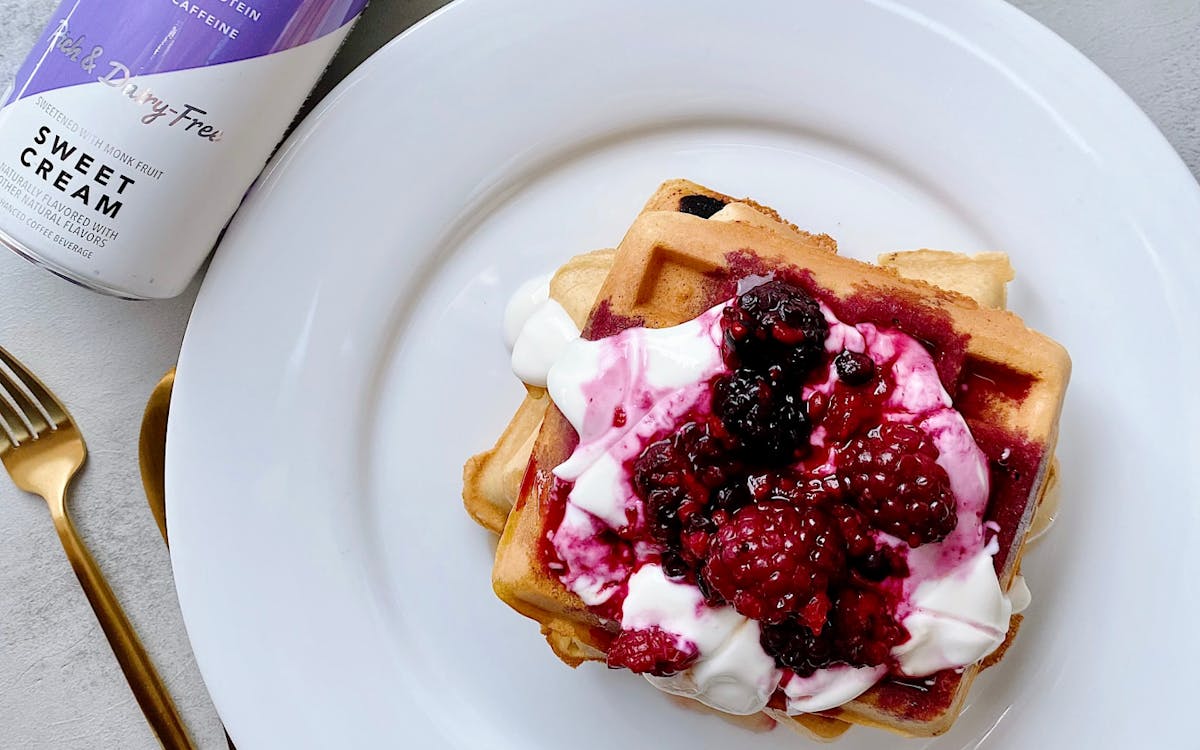
Low Carb Berries & Cream Waffles
These low carb/low sugar waffles are delicious, wonderfully crispy on the outside, and fluffy on the inside. You can also double batch and freeze for easy weekday breakfasts. Featuring our almost-...
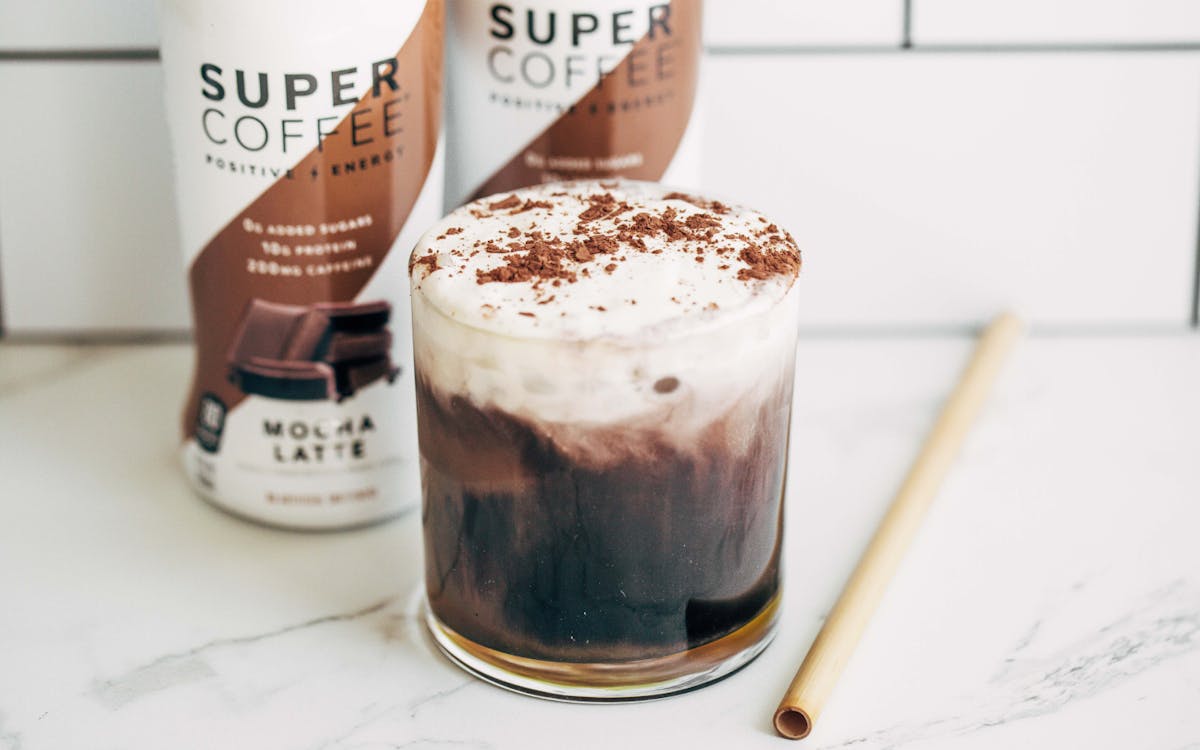
This may be the most fun latte recipe we’ve tried yet! With gooey & decadent black chocolate drizzle and a thick layer of creamy French Vanilla, just one sip of this iced latte will transport ...
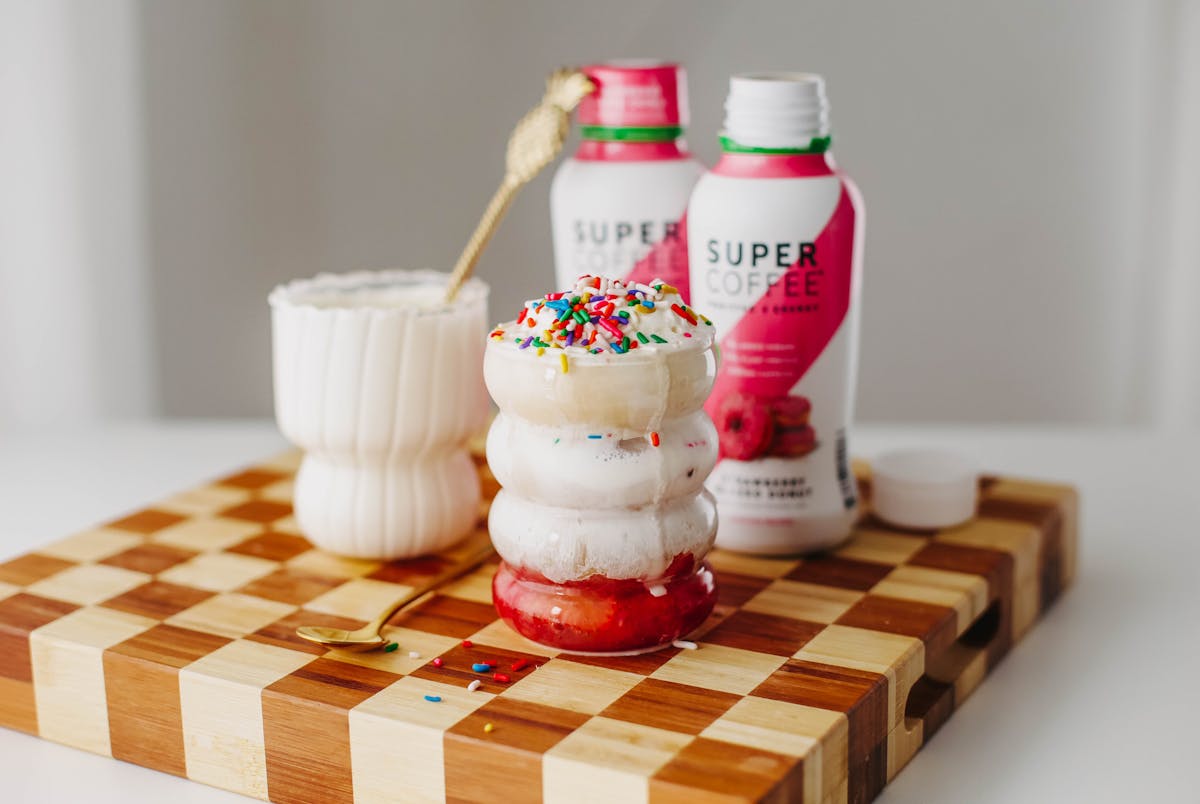
Strawberry Sprinkle Keto Coffee Recipe
Nutritional Info Calories: 274 Fat: 26.7g Carbs: 5.7g Protein: 4.5g Sugar: 2.1g Ingredients 3 strawberries, sliced. 3-4 tbsp heavy cream or half & half. Enough ice to fill a glass. 1/2 cup S...

8 Healthy Coffee Recipes That Are Better Than Starbucks
There’s no question about it. Coffee is good for you. Those who don’t like black coffee, of course, commonly add milk, cream and sugar – even if that also means adding calories, fat or carbs to the...



